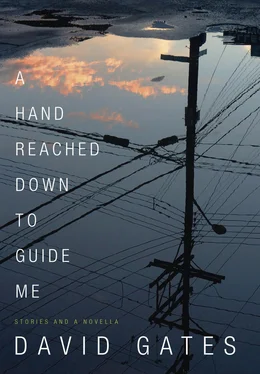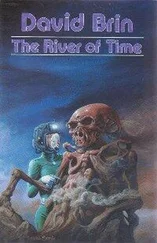—
This was the spring when I gave up and went back to work. Ever since Portland—I want to forget Cleveland, where my husband drank too much again and slept on the floor beside the bed as a precaution—I’d been writing a paragraph and deleting it, then a sentence, then a phrase, and getting out my one-hitter by ten in the morning, which made it a long day until the late-afternoon drink. I was too ashamed to call Andrea, or the Newsweek editor—at that point, though I didn’t know it, he must have been burning through his long-term disability—and I couldn’t think of anyone else. Good job of keeping up your connections. The only thing I could find anywhere nearby was a job as the so-called managing editor of a free want-ad paper in Kingston, organizing the stuff that came in—cars, sporting equipment and musical instruments with photos; sad personals without—and coming up with filler: quotes, maxims, fun facts, quizzes with the answers upside down, a joke column called “Strictly for Laffs,” with a line drawing of a toothy goon laffing. I knew not to tell the so-called publisher—a printer who also did flyers for local supermarkets—that I’d worked at Newsweek , and Yale became UConn. I accounted for the years since I’d written my column by killing off my brother and sister-in-law (yes, in a car crash) and having to take care of their children. I suppose he gave me the job because no one else with any qualifications could afford to work for so little. It was an hour each way, but at least I no longer had to trust the Tercel; my husband had bought me a red Subaru, girly but with all-wheel drive. The radio was all about Iraq—this was 2003—but I’d usually catch A Word in Edgewise around the time I was driving over the Kingston-Rhinecliff Bridge, and I would read malign significance into the expressions whose always-surprising origins she’d chosen to explain: letting the cat out of the bag, going haywire, a pretty kettle offish, taken down a peg . On the weekends I smoked when I dared, but my husband took time from his painting so we could be together. He brought me on expeditions that had a volkish vibe right out of Lolita: to Lago di Giorgio, where we ordered prime rib at log restaurants—he did; I had the salad bar—and wandered through the outlet stores, which had nothing either of us wanted; to musty-smelling country motels, which he chose for the campiness of their neon signs, where we played miniature golf among fat tourists and their fat children; to state parks where we picnicked at picnic tables, saw lakes and trees. I thought his sense of irony had gone critical; I should have realized he was running out of money.
We only went down to the city a couple of times that spring, when the Met put on an opera he was sure wouldn’t be set in a disco or a Las Vegas casino; lately he’d only wanted to see tenors in tight pants and open shirts, sopranos in big dresses, soldiers with helmets and breastplates. Instead of getting us drinks in the lobby—they were overpriced—he brought airplane bottles of Dewar’s, and we downed them on the sly during the intermissions, while looking at the costumes in glass cases. “Some brave soul,” he said, “needs to grab a whip and drive the moneychangers from the temple.” One night, we got stuck in traffic on the West Side Highway, even though it was eleven o’clock, and he said, “I hate the future.” “I don’t think it’s exactly the future anymore,” I told him. “All right, fine,” he said, “I hate the present. Isn’t that what you’ve been waiting to hear?”
I’d broken the news to him about the job only after I’d been hired, and then only after the first drink. “Ah,” he’d said. “The first move in the Great Extrication. I can’t say I didn’t see it coming. For what it’s worth, I’ve enjoyed our little idyll. Next thing we know, you’ll be making friends .”
“ You have friends,” I said. “Anyway, it’s not about that.”
“I did have friends.” It was true that no one had visited us lately. “No, you’re right, you’re too young for all this.” He swept his hand across the landscape, taking in the river, the mountain, a boat moving downstream, its sail pink in the afternoon light. “It must look like death itself to you.”
“I’m not going anywhere,” I said. “I was just losing my mind trying to be, I don’t know. What I’m obviously not. I feel like I’m disappointing you.”
“Let’s say it’s not what I’d envisioned for you. But I suppose that wasn’t my business, was it?”
“It’s not like you held a gun to my head,” I said. “A normal person would have died for a chance like that.”
“And you’re sure you’re not just going through a rough patch?”
“On the way to what?”
“On the way ,” he said. “Oh well. At your age, you have a different view of things. Will they be paying you decently?”
“No,” I said.
“Then it’s not entirely without dignity. Are they giving you insurance at least?” He’d dropped his coverage—not a good idea for a man who’d just turned seventy-three—because the premiums had gone up to six hundred a month. He’d been worried enough to visit a walk-in clinic when we got back from Montana, but he wouldn’t go see the urologist to whom they’d referred him.
“Well, the drugstore next door gives flu shots,” I said. “They have a sign about it.”
“Oh,” he said. “But it’ll pay for your gasoline? And you’ll continue to have a roof over your head. Assuming we’re still…what would one call it?”
“You’re making this into some big catastrophe,” I said. “Nothing’s going to change—I mean, you don’t want it to, do you?”
“As long as you don’t,” he said. “Probably longer.”
—
My mother’s birthday was in May, and although she’d told me that seventy was nothing to celebrate, my husband offered to take her to dinner in the city and have us all stay at the Carlyle.
“I thought we were broke,” I said.
“Bent,” he said. “No worse than a forty-five degree angle. What would you do, put her on a bus back to New Jersey?”
“We could have her here.”
“And stick her in the cellar?”
“It’s a beautiful room,” I said. “I mean, you designed it.”
“For functionality, yes. I suppose we could give her our room. She doesn’t piss the bed, does she? Should you invite your brother, just for form’s sake?”
“He’d never come.”
“How quickly they catch on, these young people. You will have covered your bases. You see, I’m looking out for you.”
But he did come. He couldn’t afford to bring the family, not that I’d asked him to, so the wife—praise Jesus!—stayed home with the baby and the two little ones. “Well,” my mother said when I told her, “that was very thoughtful of you.” She seemed content with what reconnecting she’d already done, and, having seen one grandchild, could handle the disappointment of not seeing more—just my interpretation. I had to work, so my husband drove to LaGuardia to pick him up, then out to Saddle River to get my mother on the way back. When I got home, I found the menfolk out on the deck, my husband with a glass of whiskey, my brother with a can of Diet Coke. My mother was in taking a nap. My brother got up—he was wearing a short-sleeved white shirt with a black tie—and took my hands to keep me at arms’ length. “This is some house,” he said. “I was just getting the story on it. That somebody’d see a movie and then haul off and build the thing—that blows me away.”
“Maybe it just shows I don’t have much imagination,” my husband said.
Читать дальше











